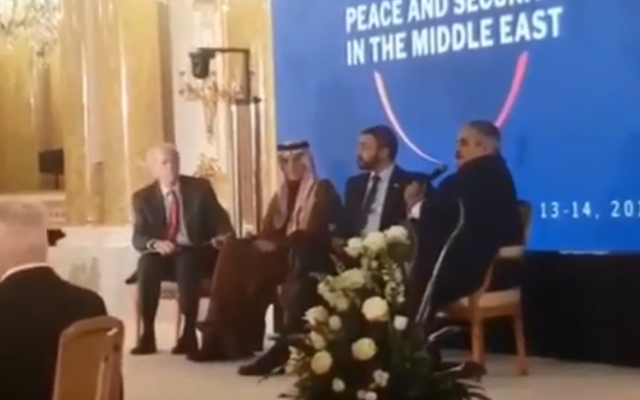In Clip Leaked by PMO, Arab Ministers Seen Defending Israel, Attacking Iran
At Warsaw Mideast summit, Bahraini FM says confronting Tehran more urgent than solving Palestinian issue; UAE top diplomat says Israel has right to attack Iranian targets in Syria

WARSAW, Poland — Prime Minister Benjamin Netanyahu’s office on Thursday leaked a video in which the foreign ministers of three Arab countries can be seen harshly attacking Iran and defending Israel, and in one case saying that confronting the Islamic Republic is more pressing than solving the Israeli-Palestinian conflict.
The 25-minute YouTube clip, a link that the PMO sent to several Israeli reporters, showed a segment from a panel discussion at the opening gala of the Warsaw Middle East conference, which was closed to the press.
The comments made by the foreign ministers widely confirmed what Netanyahu told Israeli reporters during a briefing earlier in the day, when he described at considerable length the Arab ministers’ positions.
Less than 30 minutes after reporters published the clip, the PMO removed the video from its YouTube channel.
In the clip, the foreign minister of the United Arab Emirates Sheikh Abdullah bin Zayed Al Nahyan indicated that Israel was justified in attacking Iranian targets in Syria.
“Every nation has the right to defend itself, when it’s challenged by another nation, yes,” he answered in response to a question by the panel’s moderator, former US Middle East peace negotiator Dennis Ross, about Israeli strikes intended to prevent Iran from entrenching itself militarily in Syria.
Bahraini Foreign Minister Khalid bin Ahmed Al Khalifa said that the peace process between Israelis and Palestinians would have been at a much better place if not for Iran’s malign behavior.
“We grew up talking about the Israel-Palestine issue as the most important issue” that has to be “solved, one way or another.” he said. “But then, at a later stage, we saw a bigger challenge, we saw a more toxic one — in fact the more toxic one in our history — that came from the Islamic Republic.”
If it wasn’t for Iran’s regional aggression, “we would have been much closer today in solving this issue with Israel,” Khalifa continued on, with Netanyahu, and other delegates from 60 countries looking on.
“But this is a serious challenge that is preventing us now from moving forward anywhere, be it Syria, be it Yemen, be it Iraq, be it anywhere,” the Bahraini foreign minister said.
“When we come to Israel-Palestine, we had the Camp David agreement [between Israel and Egypt in 1978]. There was [the 1991] Madrid [Conference]. There were many other ways of solving it, and had we stayed on the same path, and if it wasn’t for the … guns and foot soldiers of the Islamic Republic, I think we would have been much closer today in solving this issue with Israel. But this is a serious challenge that is preventing us now from moving forward anywhere, be it Syria, be it Yemen, be it Iraq, be it anywhere,” he concluded.
Saudi Minister of State for Foreign Affairs Adel al-Jubeir, who served as the country’s foreign minister until December 2018, argued that Iran’s belligerent activities destabilize the region, thus making Israeli-Palestinian peace impossible to achieve.
“Look at the Palestinians: Who is supporting Hamas and Islamic Jihad, and undercutting the Palestinian Authority? Iran,” he said, going on to cite several conflicts in the wider Middle East where Iran plays a destabilizing role.
“We cannot stabilize the region without peace between Israelis and Palestinians [but] wherever we go we find Iran’s evil behavior,” he said.
He also had some harsh words for the Iran-backed Lebanese terrorist organization Hezbollah.
“One of the biggest jokes is when you say Hezbollah has a political wing and a military wing. There is no such thing,” he said.
But Jubeir reserved the lion’s share of his remarks for a fundamental criticism of the Iran nuclear deal, which he said will enable Iran to acquire nuclear weapons and terrorize its neighbors within a decade, due to its controversial sunset clauses.
“When the JCPOA was signed, everyone thought everything would be fine,” he said, referring to the 2015 nuclear pact by its technical name.
“Meanwhile, we in the region are in the brunt, for us 10 years is the blink of an eye,” he went on, “So, Iran ends up with a nuclear weapon — it is theoretically capable of doing one very quickly because no limits on enrichment — who is going to suffer? We are.”
“Iran gives ballistic missiles to the Houthis [in Yemen] and Hezbollah. Who’s going to suffer? We do, in the region. And so people have to be serious about how to deal with the problem of Iran.”
Jubeir said he wished for Iran to change and become a “normal country.”
“That would be the best for all of us,” he said. “But they’re not there yet. Any attempt to be nice to them, if anything, encourages them, rather than discourages them.”
Ambassador Dennis Ross, a veteran US official, later tweeted of the event: “Same room, same views of Iran’s aggressive, threatening posture in the Middle East, and unmistakable convergence of what should be done to counter it.”
“Relations between nations are based, among other things, on trust between leaders. The filming and leaking by [Netanyahu] of statements made in a closed room, for internal election politics, is unconscionable.
“For years I have had quiet contact with Arab leaders with whom we do not share diplomatic relations, and I never publicized anything from those meetings.”




comments